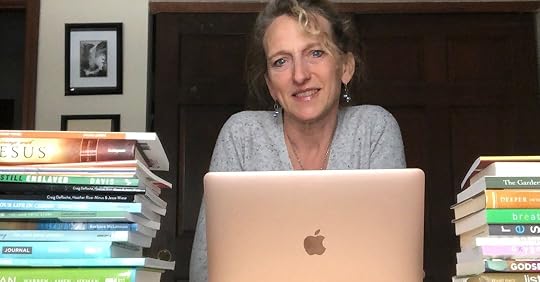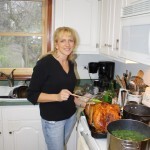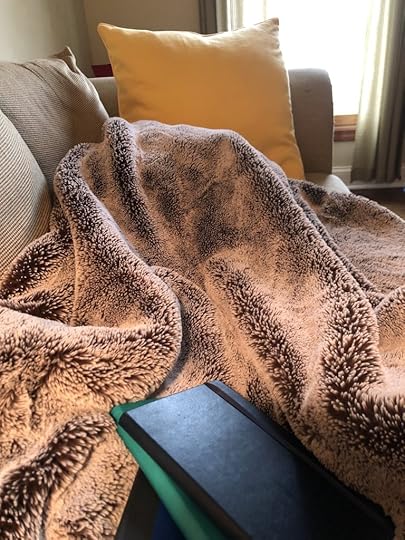Keri Wyatt Kent's Blog, page 4
January 2, 2023
Make 2023 the year you finally write your book

You’ve always wanted to write a book. What if 2023 is the year you make that happen?
You have a powerful story to tell, wisdom to share. Perhaps you’ve been working on a book, or maybe it’s been sitting on a shelf (or on your laptop) for a while. But now, you’re motivated to get it done! You just need someone to guide you, encourage you, and hold you accountable.

Photo by Victoria Borodinova (Pexels)
Writing can be a lonely undertaking.
But what if you could be a part of a writing community? What if you could sharpen your writing skills in a group learning experience that also provided encouragement and accountability? And provided a path to getting your book completed by this summer?
The Powerful Story Writers’ Group provides just that. This six-month online writing community, led by multi-published author and writing coach Keri Wyatt Kent, will take you from stuck to completed rough draft in six months. Focused on non-fiction, the group will help you define your writing goals, break them down into manageable steps, and achieve them.
A six-month online writing communityYou’ll learn together with others in this community, receiving customized instruction and coaching. You’ll be part of a writers’ group, where you can work and learn alongside other writers in an online community that provides encouragement, accountability, and practical instruction. Writing can be a lonely endeavor and having others to learn and grow alongside you can keep you moving forward. The Powerful Story Writers’ Group is ideal for those who have started working on a book but are eager to improve their writing and complete their manuscript.

Your guide and teacher, Keri Wyatt Kent is the author of twelve books, and the co-author or contributor on twelve more. She’s been traditionally published and self-published, collaborated with New York Times bestselling authors, and been working as a journalist, author and content creator for more than 30 years. She serves on the board of the West Coast Christian Writers Conference, where she has also served on the faculty.
Join this writing community and you get:the Start Your Powerful Story workbook, a brainstorming tool to help you clarify your message, determine your target reader, understand your strengths and more.live monthly writing instruction (everything from developing your book’s “hook” to how to do research) from a multi-published author, writing coach and writers’ conference instructorone 30-minute one-on-one coaching call whenever you need it during the six months.access to recorded teaching videosmembership in the Powerful Story private Facebook group, where you can ask questions, connect with other writers and get writing tips and encouragement.teaching that will improve your writing.connection and accountability of a writing community.specific, constructive, individual writing feedback via email each month.connecting with other writers to learn and be encouraged in a group setting.accountability to complete short-term and long-term goals.the satisfaction of finally finishing your manuscript!
Photo by Andrea Piacquadio from Pexels
How this writing community works:You’ll receive monthly instruction delivered via 45-minute group Zoom call. This interactive writing class is like attending a writer’s conference session once a month. Learn in focused, manageable sessions and then practice what you learn.
All members will receive the Start Your Powerful Story workbook, an in-depth tool that asks you 20 questions about your message, your reader, your story and your topic that will help focus your writing. In our first meeting we’ll go through your answers to help you use the workbook to outline your book
All group members will set a writing word count goal for the six months. We’ll break that down into monthly goals (typically 7500 to 10,000 words per month). Every month, you’ll turn in a draft of what you write. Keri will review and return your draft within one week, noting strengths and areas that need more attention.
Videos of teaching, writing tips and other content will be posted in a private Facebook group where you can interact with other cohort members and Keri. You’ll have lifetime access to the videos to review whenever you like, even after you graduate from the group.
Your assignments all move you closer to your goal of a finished draft—no writing prompts or off-topic exercises. No reading out loud or being critiqued in front of the group. Just a clear plan to complete your book in an atmosphere of encouragement and accountability.
You’ll get quick feedback and constructive critique to encourage you while bringing out the best in your writing.
The group will purposely be limited in size so you get individualized attention and mentoring.
Normally, the cost is $199 per month.
However, you can get the early bird rate of $99 per month by signing up before January 15, 2023.
The first class meets Feb. 1, 2023.
To apply for a spot in this writers’ community, fill out this Google form. There are only six slots so if you’re ready to finish your book by this summer, apply right away. Once you’re accepted as a group member, you’ll receive an invoice.
FAQ’s about this writing communityDo you offer discounts? Yes! If you register before January 15, 2023, you’ll get half off the monthly rate! That’s $600 off. And you can get a free month of coaching if you meet your word goal, or if you refer another person who joins the group. You can choose to take that in the form of a refund or in one additional month of coaching.
Will my book be ready to publish in six months? Probably not. The journey from idea to published book takes a bit longer than six months. Your completed draft should be ready for editing, and then for self-publishing. (One of our classes will cover publishing options.) We can hook you up with whatever you need next on your journey to publication, if that’s your ultimate goal.
Can I really finish my book in six months? You’ll get out of this what you put in. If you commit to the process, you’ll finish a draft in six months. It may still need some revising and polishing and will definitely need to be professionally edited. (I’ve written two dozen books and every one was professionally edited.) But if you invest the time and meet your word count goals, you can complete a draft in those six months.
Will you write my book for me? I’d love to, but that’s not what this group is about. I do offer collaborative writing services, but that’s a separate service altogether—and a considerably larger investment. (If you’re looking for a coauthor message me about that.) This group will develop your writing skills, boost your confidence and help YOU write your own book. I’ll offer feedback and coaching, but not editing, rewriting, or writing for you.
How much do I have to write each week? At the first meeting, you’ll set a word count goal for the six months. You’ll fill out a contract to commit to that goal. A standard non-fiction book is around 50,000 to 60,000 words. If you want to write a 50,000-word book, that’s 8,333 words per month. Which is 2,083 words per week. But if you write five days a week, that’s only about 417 words per each of those five days. And 417 words is less than two pages of manuscript, double-spaced, in Times New Roman 12-point font. It’s doable but takes commitment. If you complete the word count in your contract, you get one month of free coaching.
Why do we measure progress in word count? Word count is standard way of measuring manuscript length in the publishing industry. No matter what size or font, 1000 words is still 1000 words. A typical non-fiction book is 50,000 to 60,000 words. You will set your word goal at our first group coaching session and commit to that.
Who is in the group? We will have up to six non-fiction writers in this beta group. (If you are working on a novel or memoir, I can refer you to other groups specializing in those genres.) Writers will be selected based on topic, so that we don’t have overlap. The other members will not be critiquing your work, only learning beside you, asking clarifying questions, offering positive feedback and providing encouragement on the journey.
What if I don’t finish my book? That’s okay. Keri will lead another six-month writers in the future. We’ll celebrate whatever progress you make and cheer you on. But if you put in the work each week, you will finish a draft of your manuscript in six months.
Ready to apply for membership in the Powerful Story Writers’ Group? Click here to fill out the application. You don’t pay anything until you’re accepted into the group.
The post Make 2023 the year you finally write your book appeared first on Keri Wyatt Kent.
December 26, 2022
What are your writing intentions for 2023?

As yoga class begins, the instructor often invites participants to “set an intention” for the practice. It could be serenity, gratitude or being fully present. Or something else.

What’s your intention for the coming year, especially as it pertains to your writing? What will you focus on? How will you build your writing life in 2023?
The week between Christmas and New Year’s provides an opportunity to pause, to breathe. To set an intention for the year. Some folks choose a word, or let a word find them. Other make resolutions or set goals. I’m not real big on resolutions, as they’re easily abandoned. https://keriwyattkent.com/a-revolution-against-resolutions/
I re[image error]cently read and enjoyed Strength to Strength: Finding Success, Happiness and Deep Purpose in the Second Half of Life by Arthur C. Brooks. Brooks, a Harvard prof and social scientist who studies happiness, opens his book with a truth many of us would rather not hear: “your professional decline is coming.”
[image error]Yikes. And yet. The book is hopeful, as it outlines how those of us who realize we’re in the second half of life can continue to find meaning and purpose.
Our innovation and creative efforts, no matter our career, are fueled by what Brooks calls our fluid intelligence. Like anything, our level of fluid intelligence grows but then declines on a curve. Rather than clinging to the success that our fluid intelligence once provided, Brooks invites the reader to consider focusing instead on what he calls “crystalized intelligence—the ability to use a stock of knowledge learned in the past.” He writes about how to jump from one curve to the other, avoiding that decline by shifting our focus.
In other words, decline can be delayed by shifting from trying to gain knowledge (and struggling to keep up) to using the knowledge you have—in other words, tapping into your wisdom.
One way to use the stock of knowledge: mentoring and teaching.
I will hit a milestone birthday in February. Anticipating that has triggered some reflection. What do I want to do with the next decade of my life? What do I want to accomplish?
(Read the rest of this post on my Substack newsletter)
The post What are your writing intentions for 2023? appeared first on Keri Wyatt Kent.
December 21, 2022
“Bursting with God-news!” –A Christmas devotional

Many of you have purchased and read The Gift of Christmas Present this year. Thank you! As Christmas approaches, I wanted to share a few free samples from this Advent devotional with you. Here’s today’s free Christmas devotion.

Photo from www.LumoProject.com on www.freebibleimages.org
And Mary said,
I’m bursting with God-news;
I’m dancing the song of my Savior God.
God took one good look at me, and look what happened—
I’m the most fortunate woman on earth!
What God has done for me will never be forgotten,
the God whose very name is holy, set apart from all others.
His mercy flows in wave after wave
on those who are in awe before him.
Mary bursts forth with bold, prophetic words, in a song traditionally referred to as the Magnificat, Latin for magnifies, as in “My soul magnifies the Lord.”
What if joy comes not from demanding satisfaction from God, but from magnifying God? If we focus on adoration and praise, putting all other things into perspective, God becomes bigger, more prominent, more central.
When we experience God’s favor, God’s mercy—we can be filled with joy. Mary could have worried: learning you’re pregnant before you’re married would have been reason for a bit of stress, right? But instead she names her blessings, and as her praise flows toward God, it comes back multiplied magnified, intensified. You can see in Mary’s words echoes of Psalms and other Scriptures, but she’s woven them with her own experience and thoughts to create her own original praise song. She’s in the flow of joy.
Journal: Write down three things you are grateful for. Take time to reflect on them, to thank God for them, to let them pull you into the flow of joy. Let God’s mercy flow on you in wave after wave. Write about what this experience feels like, what God says to you in response to your gratitude.
Pray: God, thank you. Your mercy is flowing on me—help me to recognize it, to step into the flow of your goodness, to be aware of your power and love all around me.
If you enjoyed this free Christmas devotional excerpt from The Gift of Christmas Present, please share this post!
The post “Bursting with God-news!” –A Christmas devotional appeared first on Keri Wyatt Kent.
December 20, 2022
Free taste of The Gift of Christmas devotional

Christmas is less than a week away. Many of you have purchased The Gift of Christmas Present, my Advent devotional. (Thank you for doing so!) This week, I’ll be sharing a few excerpts from the closing pages of the devotional, all of which focus on joy. So if you’re looking for a free Christmas devotional to anchor you the next few days, we’ll have it for you here, as my free gift to you.
Here’s today’s excerpt, which includes a Scripture, reflection, journaling prompt and prayer. I’d love to hear your response to the journaling question in the comments!

Photo from www.LumoProject.com, found on FreeBibleimages.org
39 A few days later Mary hurried to the hill country of Judea, to the town 40 where Zechariah lived. She entered the house and greeted Elizabeth. 41 At the sound of Mary’s greeting, Elizabeth’s child leaped within her, and Elizabeth was filled with the Holy Spirit.
42 Elizabeth gave a glad cry and exclaimed to Mary, “God has blessed you above all women, and your child is blessed. 43 Why am I so honored, that the mother of my Lord should visit me? 44 When I heard your greeting, the baby in my womb jumped for joy. 45 You are blessed because you believed that the Lord would do what he said.”
Mary embarks on an adventure like no other: to bear and raise the Son of God. In the face of mystery, Mary chooses joy, rather than fear.
I love this chapter of Luke because it’s so radical. It was written into a patriarchal culture, to an audience that did not value women. And yet, both Mary and Elizabeth speak God’s truth with remarkable assurance and strength. There is no man-splaining allowed—in fact, Elizabeth’s husband John has literally been muted, struck dumb for his doubt.
Elizabeth feels the movement of her unborn child (who would grow up to be John the Baptist) and recognizes it as a jump for joy. The text connects joy with the Holy Spirit. She knows Mary’s news before her young niece can speak a word. She affirms Mary’s faith. She uses the word “blessed” three times: twice to describe Mary, once to describe her child. And why is she blessed? Because of her faith: “because you believed that he Lord would do what he said.”
We get it backwards, don’t we? We think if we get blessings, we’ll have more faith. But the opposite is true: we get blessings (including joy) from simply having faith.
We’re often seeking blessing, striving for God’s favor. But Mary has found it simply by believing.
Journal: We’ll read Mary’s response tomorrow, but for now, focus here. Where are you seeking God’s blessing? What situation do you need to reframe and believe that God will do what he promises?
Pray: God, sometimes my doubts destroy my joy. Today, I want to believe that you will do what you said.
Leave a comment below. Want to grab a copy of The Gift of Christmas Present? Find it on amazon.
The post Free taste of The Gift of Christmas devotional appeared first on Keri Wyatt Kent.
December 19, 2022
What is a coauthor?

The Powerful Story newsletter is out!
This week, we’re talking about what it means to hire a coauthor (also called a cowriter or collaborative writer).
Here’s a preview of the newsletter:
You’ve got a great idea for a book. Or maybe you’re an expert in your field, or a leader in your profession. You want to write a book, but you’re not sure how to begin, or even more importantly, how you’d ever finish.

Many authors get a little help along the way. They employ someone to help them a lot (a ghostwriter), a little (a writing coach), or something in between.
That in between space? It’s where you’ll find a coauthor.
Read the entire newsletter (and subscribe for free!) HERE.
The post What is a coauthor? appeared first on Keri Wyatt Kent.
December 14, 2022
Feeling overwhelmed? God is with you. Don’t be afraid.
 God is with you
God is with youImagine yourself as a teenager, from a poor, obscure village. An angel appears and tells you:
You are highly favored. God is with you. Do not be afraid. (Read the full story in Luke 1)
Mary’s response to the promises: she is “greatly troubled.” Why? Perhaps she figured, God’s favor and presence sometimes comes out of necessity. (As indeed, it did.) God offers favor not just so we feel good, but to give confidence, strength, power as we move forward into a new adventure. A divine assignment. A rather overwhelming one.
What assignment lies before you right now? One of my friends will bury her husband this week. And then she and her three kids will walk on through life without him. She knows God is with her, but it’s a hard road.
Another friend is at chemo today, as she is every other week. Her strength in the face of this comes, I know, from her faith. God is with her. But it’s still hard.

We can do hard things. But that doesn’t make them easy. What makes them doable is the promise that the angel gave to Mary: you are favored. God is with you. Don’t be afraid.
Mary hadn’t heard anything about what God was asking her to do. Way before she said yes, the angel reminds her of truth: you are highly favored. God is with you. She didn’t have to earn that favor because it was already there.
Way before she agreed to this highly inconvenient divine assignment, God told her that she was loved, and she was not alone. God offered unconditional favor, a promise of presence.
What are you afraid of? What challenge are you facing?
Where do you need God’s favor and presence?
The angel’s parting words: “no word from God will fail.” Other translations put it, “Nothing is impossible with God,” which of course seems, well, impossible. Despite prayers for healing, people get cancer. People die. We struggle. So, what does it mean that nothing is impossible with God?
I don’t have all the answers. But here’s what I know. This season we focus on Christ’s birth—Emmanuel, which means, God with us.
How does that presence manifest? In others. This week, I’ve watched my little band of friends rally around Maria, whose husband died on Sunday. We’ve brought food, we’re helping with details for the wake, supporting as best we can. We’ve said yes to offering God’s love in the only ways we know how.
Who needs to feel “God with them” through you?Maybe you’re lonely and uncertain this holiday season—who might be feeling the same way and needs you to reach out? Who needs to experience “God with them” through you? To simply let them know they are loved, and seen?
Today’s verse in my Advent devotional, The Gift of Christmas Present is incredibly prescient: “My dear, dear friends, if God loved us like this, we certainly ought to love each other. No one has seen God, ever. But if we love one another, God dwells deeply within us, and his love becomes complete in us—perfect love!”
What if Emmanuel, God with us, is the assignment God offers to each of us? To be a completer of God’s love to others? What if God draws near when we are loving each other?
You don’t earn God’s favor by loving others. You simply become more aware of it. Like Mary, you are highly favored. God is with you. You don’t need to fear.
Mary said yes to this inconvenient assignment. And experienced the presence of God. What do you need to say yes to this week?

The post Feeling overwhelmed? God is with you. Don’t be afraid. appeared first on Keri Wyatt Kent.
December 12, 2022
Finding joy in the darkness

My phone’s weather app calmly advises, “Cloudy conditions will continue for the rest of the day.” And from the forecast, it appears, the rest of the week as well.

Outside my back door, bare branches lace their bony fingers across the pewter sky. At 3 p.m. dusk feels imminent, so I plug in the Christmas tree lights to ward off the gathering gloom. But the darkness pervades.
My default optimism appears to be overridden by the weather and some heavy circumstances.
In the past few weeks, three close friends have lost family members. My co-author and friend lost his wife, Karen. My next-door neighbor’s mother, Bridget, passed away. And yesterday, another good friend’s husband, Bob, died of cancer, gone too young.
I feel my friends’ pain, their sadness. I say their loved ones’ names, honor their memories.
A lesser loss, but still an ache: today I mailed a package of Christmas gifts to my son, whom I have not seen in nearly a year, and will not see at Christmas. I’m grateful for his health and strength and even his independence, but sometimes the distance gapes like a wound.
Sunday at church, our Advent liturgy included these lines of call and response, stunningly appropriate:
We can look around and see all kinds of reasons not to feel joyful
Until we learn:
Joy is not felt
Joy is found.
I almost gasped aloud. Around me this month, despite the holiday merriment, I am hungry for joy.

Joy is found. Joy is found?
Where??
The liturgy again:
This is the joy given to us:
To love and be loved
To sacrifice and be blessed
To be lost and found.
Could there be joy in loving my friends in the midst of their loss? Could I find joy in sacrifice?
What if joy comes from knowing that even when I get lost, I am found? And in being found, find joy.
The post Finding joy in the darkness appeared first on Keri Wyatt Kent.
December 5, 2022
Don’t let fear steal your joy. Or your voice.

This is a loud season, full of good busy and hectic hustle, both joy and stress. We long for a simple and meaningful Christmas, we want to be present during this Advent season. Often, our fear gets in the way of our faith.
We want to gather, but the threat of Covid still kind of lurks in the background even as we plan celebrations. Everything is more expensive and we’re kind of thinking–maybe we should dial it back a notch. Make Christmas a little simpler. But even as we strive for simplicity, we see others for whom “simplicity” is not a choice but their only option.

I see you, harried one. Drowning in to-do lists and projects, work and kids and social obligations. I see you, wanting to do something about the suffering or struggles of others, yet uncertain of how to help, and not sure how you’d find the time to do any more anyway. Feeling overwhelmed, longing for rest.
The counterintuitive truth: sometimes our most meaningful action is preceded by quiet reflection. Contemplation, pondering things in our heart, can help us to not just act, but to set our intentions in the most meaningful and helpful way.
You know that the days between now and Christmas will be full. What would happen if you carve out time to be quiet and listen to God, making space for God to speak to you and guide you through this hectic season? Could you give yourself the gift of a few quiet moments.
In that spirit, here’s an Advent post that I wrote a few years ago about one of my favorite characters in the Christmas story, Zechariah. It’s an invitation to consider the power of quiet–even quiet we may not choose.
Click here to read the rest of this post.
The post Don’t let fear steal your joy. Or your voice. appeared first on Keri Wyatt Kent.
November 14, 2022
Practice giving thanks on Thanksgiving

Thanksgiving is next week. A day for gratitude, hospitality, and occasionally, stress. Rather than get tangled in planning, why not make this season a time for gratitude and actually, you know, thanks giving? A time to practice gratitude, hospitality, and simplicity?

Photo from Pexels.com
Here are three quick tips to make Thanksgiving less stressful and more meaningful.

Thanksgiving is not about impressing people, it’s about creating space for folks to enjoy time together and to express gratitude. To that end, I wanted to share this edited excerpt from my book GodSpace, which explores seven spiritual practices, including gratitude.
Give thanks to the Lord, for he is good;
his love endures forever.
(Psalm 118:1, also Psalm 107:1, and several times in each Psalm)
Unlike Easter or Ramadan or Hanukkah, Thanksgiving it is not specifically tied to a faith tradition. It invites everyone, faith or none, to be a little spiritual and practice gratitude. No one asks, “What is the real meaning of Thanksgiving?” because, thanks giving is also a verb.
Thanksgiving is giving thanks. It’s active; you do it. While our culture has created some traditions around it—turkey, mashed potatoes, football, hanging out with relatives whom you may not even like that much—the focus of the holiday is still giving thanks. Recent calls to remove bias from our history (um, the Pilgrims were not always very kind to the Native Americans) don’t change the truth that Thanksgiving, at its heart, about gratitude.
Christmas has been commercialized and politicized; happily, nobody argues about whether we should say “Happy Thanksgiving.” Even people who don’t believe in God celebrate Thanksgiving, and express gratitude, if not to a higher power, to the people around them. The commercialism machine is trying to encroach on this day to be thankful, with stores opening not just on Black Friday, but on Thanksgiving! I resist that. I’m all #optoutside instead.

Photo from pexels.com
Thanksgiving is about gratitude—even when it’s hard. When your family squabbles or when you’re sad because someone who once sat at your table isn’t there this year—for any number of reasons, still, it’s a day to express thanks, to remember the goodness of God. And when it is hard, as holidays can be, when you feel sad or lonely, it is a day to choose gratitude, to lean into those realities and say “thank you, Lord” in spite of the circumstances. Sift through life’s debris, and find the gems.
Confession: at Thanksgiving, I need to lean in to the practice of simplicity, because my greatest temptation is to overdo things. Brine the turkey, make everything from scratch, use chargers under the plates—a mostly ornamental addition that never graces my table except at the holidays. They’re basically a plate for your plate. But it looks so fancy, I convince myself they are necessary. But I digress.
Thanksgiving is one of the few times of year I go on Pinterest. I have a stack of food magazines with turkeys on the cover that I save and look through each year, having earnest debates with myself about what to cook and how to cook it. I love planning the menu, cooking, creating a beautiful table. I have to remind myself: this is not about the fancy meal; this is creating a space for gratitude, for hospitality. I make myself spend time not just planning the menu but

Thanksgiving meal prep a few years ago.
thinking about how to get conversation to a deeper place with a group of folks who may not want to go there.
(Want to read more of this chapter? Grab your own copy of GodSpace from amazon)
This year, I’m leaning into gratitude, and staying off Pinterest. I’m not even sure who’s coming to dinner, and friends, that both stresses me and feels like progress in my quest to let go and welcome all.
The post Practice giving thanks on Thanksgiving appeared first on Keri Wyatt Kent.
November 7, 2022
What if shortening days are a chance to hygge?

Daylight saving time ended this weekend, and I’m pretty sure we all have feelings about it.
In years past, I’ve mourned the loss of lingering evening light. Darkness literally falls, collapsing quick and early. If you’re one impacted by seasonal affective disorder, the shortening days, and the shifting of the clocks, can make things fraught.

This year, I’m trying something different:
To accept the things I cannot change, as the prayer goes.To embrace the invitation issued by the turn of the planet.To slow down, to get cozy, to practice what the Danes call hygge (pronounced hoo-ga).According to The Little Book of Hygge, which I read in front of the fireplace yesterday afternoon, hygge means “a sense of comfort, togetherness, and well-being. ‘Hygge is about an atmosphere and an experience…It is about being with the people we love. A feeling of home. A feeling that we are safe.’”
Wikipedia notes that hygge comes from a Danish word meaning “to give courage, comfort, joy”. It’s also related etymologically to the word hug.

And by the way, a fireplace, especially my wood-burning one, ups the hygge factor significantly. I wore fuzzy socks and snuggled into the pillows on the couch.
Doesn’t that sound lovely?
I can’t help but notice that hygge feels like it belongs on the same Pinterest page as practices of Sabbath and hospitality—two themes in my life, especially this year.
Hospitality is not about entertaining, much as our culture tries to equate the two. It is more about welcoming. About gathering people not to impress them but to offer them a place to feel welcomed, included, comforted.
Hygge’s accoutrements include woolen socks, blankets and hot drinks—coffee, tea or mulled wine. But at the heart of it something more—a sense of community. While you can hygge by yourself, the practice is meant to be shared. Hygge, I am learning, is about gathering a small group of friends, not to entertain but to connect in an informal way. In other words, to practice hospitality. Like Sabbath, it is a restful reprieve, often focused on the table.
As the days shorten, I want to welcome the chance to rest. The sunrise shifts, making my early morning runs more palatable. I will revel in the precious moments of daylight—getting outside even when it’s cold boosts my mood and my immune system.
So I’m also resolved to slow down, to read by the fire, to make comfort food and share it with friends.
As I write this, the sunset paints pale pastels behind bare branches, at 4:45 p.m. The house is redolent with the scents of a pot roast lounging in the crock pot with mushrooms and red wine.
For all this coziness, we cannot hibernate completely. And I don’t think that is the point of hygge, or Sabbath. Yes, we still have our work—we can’t rest all the time. In fact, what makes rest sweet? The very striving and hustling that we rest from. My goal this winter is to work hard, but also to embrace a hygge rhythm, a Sabbath rhythm. To make each day a cycle of work and rest, of light and dark, of fellowship and solitary contemplation.
Maybe what I’m after is the gift of a changed perspective, an acceptance of what is. Permission to rest and get cozy instead of complaining. To light candles and cuddle up on the couch, but also to put down my phone and spend time reading, writing or simply thinking.

My couch getting its hygge on. Fuzzy blanket, journal, pillows. Check, check, check.
As the trees surrender their leaves to November winds, and the days grow darker, you may be tempted to isolate. But what if the shift of seasons could be an invitation to connect—not to impress, but to light a candle or two in the darkness and banish loneliness by embracing hygge?
I’d love to hear your thoughts on hygge: your own practice, book recommendations, or questions.
The post What if shortening days are a chance to hygge? appeared first on Keri Wyatt Kent.



